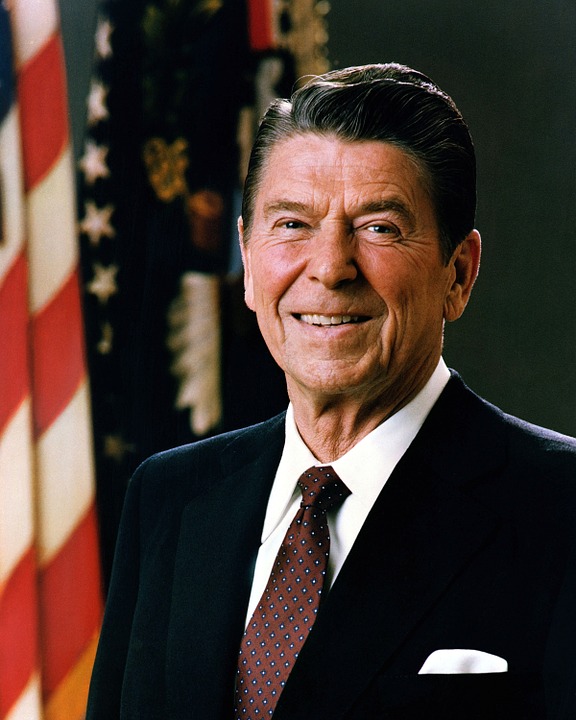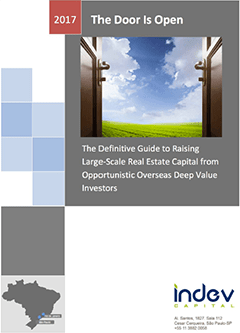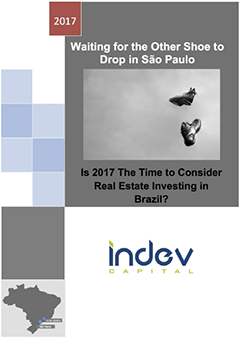
Our journey begins in Durham, NC at Duke University
On February 8, 1988, President Ronald Reagan came to Durham, NC, one of the most important cities on earth (full disclosure, Durham is also my hometown so I may be slightly biased), and spoke at Duke University. A high school classmate and close friend’s late father was President of Duke University and by fate of chance your author had a close-to-front-row seat to see a sitting United States President (POTUS).
For those readers not old enough to remember, in 1988 Reagan was a very popular president and he ended his term with a 63% approval rating, according to The American Presidency Project at the University of California at Santa Barbara. Historians widely rate him as the best president since World War II.
At the time, I was 17 years old and had a nice afro that I definitely undervalued based on my current hair status (or lack thereof). To this day, I cannot forget the enthusiasm when the announcer said, “Ladies and Gentlemen, The President of the United States….” It was an awesome moment. The enthusiasm and passion in the crowd were just incredible. Why?
The Purpose of This Newsletter
This newsletter’s objective is to dive deeper, actually as deep as one can in our short time together on a Wednesday morning, into another aspect of our 2017 deep value real estate investment strategy: politics. The author hopes to provide a quick overview of what is happening currently in Brazilian politics and how, although he has a popularity percentage of less than 10%, Brazil’s President Michel Temer is quietly executing “Reaganesque” changes.
Most importantly, the author hopes to provide a perspective on how these political changes affect the deep value investment strategy that our firm is focused on helping global real estate investors understand and execute in 2017. I want to thank Ibsen Costa Manso, an expert political journalist and consultant who was very helpful in this newsletter. InDev Capital and Ibsen will be working together this year to provide a deeper and detailed perspective on political economics of this deep value investment strategy. If you are interested in learning more about our premium level newsletter that covers specific investment ideas and deeper political and economic analysis, please click here.

Politics = Economics
“A country where the politics matters at least as much as the economics.”
Definition of an emerging market from the highly regarded political scientist and founder of Eurasia Group, Ian Bremmer
Our journey of understanding moves to a wonderful place called Dixon, Illinois
One of my closest friends on earth is from Dixon, IL. Dixon is a small town of 15,000 about 100 miles west of Chicago. It is one of the great small towns of America, a place where you can literally feel the common sense and decency of the people.
During a vacation at Harvard Business School when many students travelled to the major cities in Europe, Asia, and other exciting locations, my close friend decided to get a group of guys together and head to Dixon, IL. This was not the most glamorous of trips, but unforgettable nonetheless. It was a remarkable experience learning about where he was from, his parents, small town life, and the highlight, at least for me, was visiting the Ronald Reagan family home.
So What Made President Ronald Reagan So Important for Understanding the Deep Value Trade in Brazil?

Ronald Reagan
While Reagan’s accomplishments are numerous in foreign policy, let’s focus on his domestic policy. His economic policy of “Reaganomics” – a combination of two significant tax cuts, the Economic Recovery Act of 1981 and the Tax Reform Act of 1986, a reduction of business regulation, and a reduction of government spending – was a significant change in policy up to that point.
So why the love for Reagan at Cameron Indoor Stadium in 1988? Well, the results of his policies begin to tell the story. From Investopedia, “The top marginal tax rate on individual income was slashed to 28% from 70%, and the corporate tax rate was reduced to 34% from 48%. Reagan continued with the reduction of economic regulation that began under President Jimmy Carter and eliminated price controls on oil and natural gas, long distance telephone services and cable television. In his second term, Reagan supported a monetary policy that stabilized the U.S. dollar against foreign currencies. Although economists and politicians continue to argue over the effects of Reaganomics, it did usher in one of the longest and strongest periods of prosperity in American history. Between 1982 and 2000, the Dow Jones Industrial Average (DJIA) grew nearly 14-fold, and the economy added 40 million new jobs.”
Quick Aside
**Again, I know that I will receive some emails from some friends of mine that will state the unintended consequences of supply-side economics. Some of these emails will likely be emotional and will come from cities such as San Francisco and Toronto and perhaps even family members in the Great State of North Carolina. Guys, you are my friends and family, we went to college, grad school, and grew up together! My late mother and father were not Reagan fans and are screaming at me right now. But alas, I am strictly speaking as a deep value investor and advisor Mom and Dad. By the way, I love you all very much!!!!!**
Back to Deep Value Real Estate Investing!!!!
However, for investors, the general economy, and job creation it is hard to argue that Reagan did not do a remarkable job lifting the economy from stagflation, high unemployment, high inflation, and stagnant demand.
Reagan’s policies were very much needed at the time and they were almost revolutionary. Perhaps only in an era after a period of stagflation could these changes happen. Ronald Reagan was the right guy at the right time.
For President Reagan fans, click here for a great video of The Power of Reagan’s Wit and Humor.
Our Journey Now Takes Us to the Small Town of Tietê in the State of Sao Paulo, Brazil.
Michel Temer, the current president of Brazil, is from a small town of roughly 40,000 inhabitants. President Temer’s popularity rating is lower than that of a screaming baby at a meditation retreat. In fact, 35% of his cabinet is under investigation in a large historic corruption scandal. Temer came to power not through an election but from an impeachment of a sitting president. This impeachment process was instigated by a Speaker of the House who is now serving a preventative sentence with no certain release date. He is in jail and under investigation for receiving a R$5M bribe per the Car Wash Investigation with Petrobras. For those fans of The Wizard of Oz, “This is not Kansas (or Dixon, IL, author’s addition) anymore…”
Doing the Ugly Work – An Unpopular Transformational Leader
There will likely not be a Michel Temer National Airport in Brazil’s capital…
Besides perhaps this newsletter, President Michel Temer will likely never be mentioned in the same sentence as President Ronald Reagan. However, keep an open mind and let’s go deeper into this unsung hero.
Ronald Reagan, as stated earlier, executed significant policy changes after a period of stagflation, defined as high inflation and high unemployment. These changes were structural and had a large impact such as tax reductions on individuals, businesses, and investment, decreased regulation, reduced government spending on domestic programs, and a tighter money supply to fight inflation.
Alas, our current deep value investment hero, Michel Temer, entered the Brazilian Presidency with a similar “stagflation-like” environment. In fact, before Temer assumed Brazil’s Presidency, inflation had reached 8.97%, interest rates peaked at 14.25%, and unemployment had reached 11.8%.
 President Temer does not have an elected politician mandate; however, international investors need to be aware that this individual is a hero among us. Due to an unusual combination of factors, President Temer and his administration can have a “Reaganomics” type of impact on a deep value investor’s investment thesis in Brazil. Why? He has started the necessary Spring Cleaning of Fiscal Discipline and reduction of regulation.
President Temer does not have an elected politician mandate; however, international investors need to be aware that this individual is a hero among us. Due to an unusual combination of factors, President Temer and his administration can have a “Reaganomics” type of impact on a deep value investor’s investment thesis in Brazil. Why? He has started the necessary Spring Cleaning of Fiscal Discipline and reduction of regulation.

President Temer is literally “Moving Mountains” in Brazil (no connection to Usher’s Moving Mountains video, great video if you need a quick break, but similar passion and effort!). How many investor newsletters tie R&B to deep value investment strategies? 🙂 Let’s talk about the four Moving Mountain type changes our Hero President Michel Temer is executing!!!!
Go Michel, Go!!!!
Mountain #1 PEC 55 – Already Climbed
The First Mountain is PEC 55, a crucial piece of legislation that has already passed. We covered this legislation in our December newsletter. PEC 55 forces the Brazilian federal government to keep expense increases only at the level of inflation constitutionally.
The only flexibility is in what budget lines to cut. However, there is no longer the ability to run fiscal deficits as in previous administrations. It is now not a matter of whether there will be cuts but what will be cut. This was approved on December 13, 2016 with a vote of 53 to 16 in the Senate. It is the building block of all the other cuts that are occurring currently. This is not easy work. It is literally “Moving Mountains.”
This assures that there is fiscal control going forward. This will likely put at least some limit on the currency variations going forward. In addition, this should, for the medium term, put a lid on interest rates and inflation.
Mountain #2 – Normalizing Labor Laws – Climbing in Progress
Brazil’s current labor system was created by President Getúlio Vargas in 1943. This was a different era in Brazil and corporations were somewhat exploitative. At that time, the population demanded better protections and the labor laws created were a significant step forward. One could reasonably argue that these laws were needed at the time. The laws created a system called CLT, or (Consolidação das Leis do Trabalho).
The CLT system created significant labor rights very much in favor of the employee over the employer. These laws have continued with very few adaptations to the modern work environment in Brazil. Here are some of the requirements that employers face if they hire a full-time registered employee in Brazil.
- Mandatory 30 paid vacation days per year (even for small companies)
- Mandatory 13th Salary bonus at the end of the year – A government-imposed bonus program
- Very defined working hours even for highly paid white collar staff, including overtime etc.
- Until very recently, labor law banned outsourcing any core function of a business
- Firing an employee has a significant cost, so much so that often people will keep ineffective employees on staff as opposed to firing them
- Believe it or not, the cash incentive to get “fired” is so great that people will not leave a job voluntarily in many cases and will stay until they are fired even if they do not like the company or position
- The taxes and contributions (unions) to have a full-time employee equal approximately 100% of the wage and this is paid for by the employer
To avoid these laws, a HUGE percentage of companies, particularly those with many higher income employees, have their employees create small companies as if they are independent contractors. So a small company with 20 employees literally could have 15 or even 20 “independent contractors” showing up to work every day who are effectively full-time employees.
However, if the employer ever fires the employees, these “independent contractors” can sue for the rights they would have had as registered employees. This can add up to a significant sum of money based on the employee taxes which can be almost 100% of the wage. If a long-term independent contractor that served as a full-time employee sues the company, he is likely to win and the numbers can get quite large. So these payments to subcontractors are actually liabilities and there is a whole legal profession of finding these employees and suing the employers. However, if some companies did not hire this way, they simply could not hire or could at most hire only ½ the staff they currently have. It is just math, nothing personal. That extra 100% cost per employee mentioned above is a very, very big deal.
The impact of this system is significant. It lowers business productivity (there are lots of people whose main job is to work the “work-arounds of this system”), significantly reduces workforce flexibility in the labor market, adds significant costs, and creates zombie employees who are unproductive waiting to get fired. A University of Chicago Economics PhD, while a wonderful helpful asset (and if you have one and would like to help write the next newsletter please email me and joseph.williams@indevcapital.com) is not necessary to understand that improving Brazil’s labor laws will unlock productivity and have an impact on the economy.
Temer’s Actions on Labor Laws
Currently, Temer is working on changing labor laws in the following ways: the question of negotiation over legislation, or rather, the prevalence of what is negotiated between companies and workers against what is legal; outsourcing for all a company’s activities; the question of intermittent work, with work paid per day or hour of service and working remotely, which regulates working from home; career plans will now be negotiated between the employer and “representatives” of employees; union dues become optional; workers will no longer be able to miss Labor Court hearings and will have to bear all costs of the process. It is the second major test, after the first Mountain (PEC 55) in his government. These changes are not popular and again would not be possible without a severe downturn and a President who was not elected and not running for re-election. There is not too much lower to go than a 10% popularity ranking.
How can an unpopular president pass laws that are this difficult?The quick answer is that there is a general acceptance that these changes are the only way to bring the economy back in line. In addition, there is significant “horse trading” of government jobs etc. behind the scenes to get the votes necessary.
Impact of Labor Law Changes
These changes will greatly help both large and small businesses by lowering costs and improving efficiency. This will boost the economy. I am a small business owner in Brazil and I have very personally seen how this changes behavior and can hit you in the gut when you can least afford it. Brazil’s employment laws force entrepreneurs to do as much as possible with as few full-time employees as possible or use a work-around with the ubiquitous independent contractor system that builds up a corporate liability every month you have this “independent contractor” as a full-time employee.
When a business grows its number of employees and must then reduce its staff due to a lack of demand or a business shift, which obviously happens, the cost of releasing people is EXTREMELY high at a time when the business is in its worst position to pay significant severances. Once a business owner experiences these payments, he or she is very, very reluctant to hire staff unless absolutely necessary.
Mountain #3 State Budget Reform – Enforcement of Discipline – Climbing in Progress
Due to a combination of mismanagement, the financial crisis, and, sadly, in some cases corruption, many states in Brazil are effectively bankrupt. In fact, some of the largest and formerly richest states are in this situation, for example Rio de Janeiro and Rio Grande do Sul. During the commodity super cycle from 2003 to 2012, many states were led by a populist government that believed in a larger government payroll. Some state governments grew their state payrolls to levels that were completely unsustainable. For example, Rio de Janeiro’s expenses with the payment of active and inactive employees and pensioners of the Executive Power have exploded in recent years. According to data from the State Board of Planning and Management, in 2010 17.2 billion reais were spent. In 2016, this increased to 37 billion reais – almost double. Even in the best of times this would be hard to sustain. Well, the party ended quite violently with the downturn of the price of oil, a huge factor in the Rio economy.
The Temer government is correctly using the situation of select governments to enforce discipline on state budgets similar to a PEC 55 process. Temer is working to implement this not just with the states that have significant financial problems but with all states. Go Temer, Go… again Moving Mountains!
This is important because the states obviously pay a portion of their revenue to the federal government. Although the average citizen of Brazil does not see these tax dollars in terms of public services, infrastructure, and definitely not in the avoidance of random potholes, this forced discipline will assist in the government budgeting process and provide a pillar of financial strength for the country. Fiscal discipline in Brazil is always welcome.
Mountain #4 Social Security – Retirement Benefits – The Biggest Mountain – Climbing in Progress

A NY Times article on Oct 20, 2015 outlines the problem very well. “Brazilians retire at an average age of 54, and some public servants, military officials, and politicians manage to collect multiple pensions totaling well over US$100,000 per year. Then, once they die, loopholes enable their spouses or daughters to go on collecting pensions for the rest of their lives, too.”
The demographic bonus of Brazil is quickly evaporating. As with many modern societies, the age and the number of children that people have is lowering. In fact, the average number of children per woman in Brazil has dropped 2.14 per woman to 1.74 per woman in the past 10 years, according to IBGE (Brazilian Geography and Statistics Institute).
In fact, 12.5% of Brazil’s GDP is spent on retirement benefits. In the recent past, there was excessive abuse of this system. For example, previously a congressman with 2 mandates (8 years) who was 40 years old could receive a pension for the rest of his life. Police officers and other government officials, specifically judges, passed away and their pensions continued for their descendents, sometimes for generations. Even today, government employees’ pensions are equal to their already very high wages and indexed to inflation. This is a balloon that will pop and pop badly without some changes.
Pension / Social Security Changes in Process
It is clear that significant parts of the pension system will be reformed, particularly the crazy excesses in the system. This is very significant as it is by far the biggest expense savings and also stands as the biggest risk if nothing is done.
Ronald Reagan was not from Rio… But Hopefully You Now Know More about the Politics of This Deep Value Trade.
This newsletter was not to state that President Michel Temer will ever have the popularity of President Ronald Reagan. Nor is it likely that the City of Brasília (national capital) airport will be renamed in his honor (it probably should because how many people attempt to move four mountains!!!!).
However, for deep value real estate investors, due to Temer’s efforts, something similar to Reagan’s effect could be happening in Brazil right now. No, it is not pretty. If you study more of Brazilian politics, you will learn to understand just how “winning ugly” this work of President Temer truly is, but some fundamental big rocks are moving and investors are wise to take notice.
President Michel Temer, keep Moving Mountains Big Guy, Keep Moving Mountains! I cannot vote but I am pulling for you. If this somehow reaches you and you are in Sao Paulo, I am available for beer!!!! I will start a fan club!
Thanks for reading!
Warm Regards,
Joseph W. Williams
CEO & Founder InDev Capital





